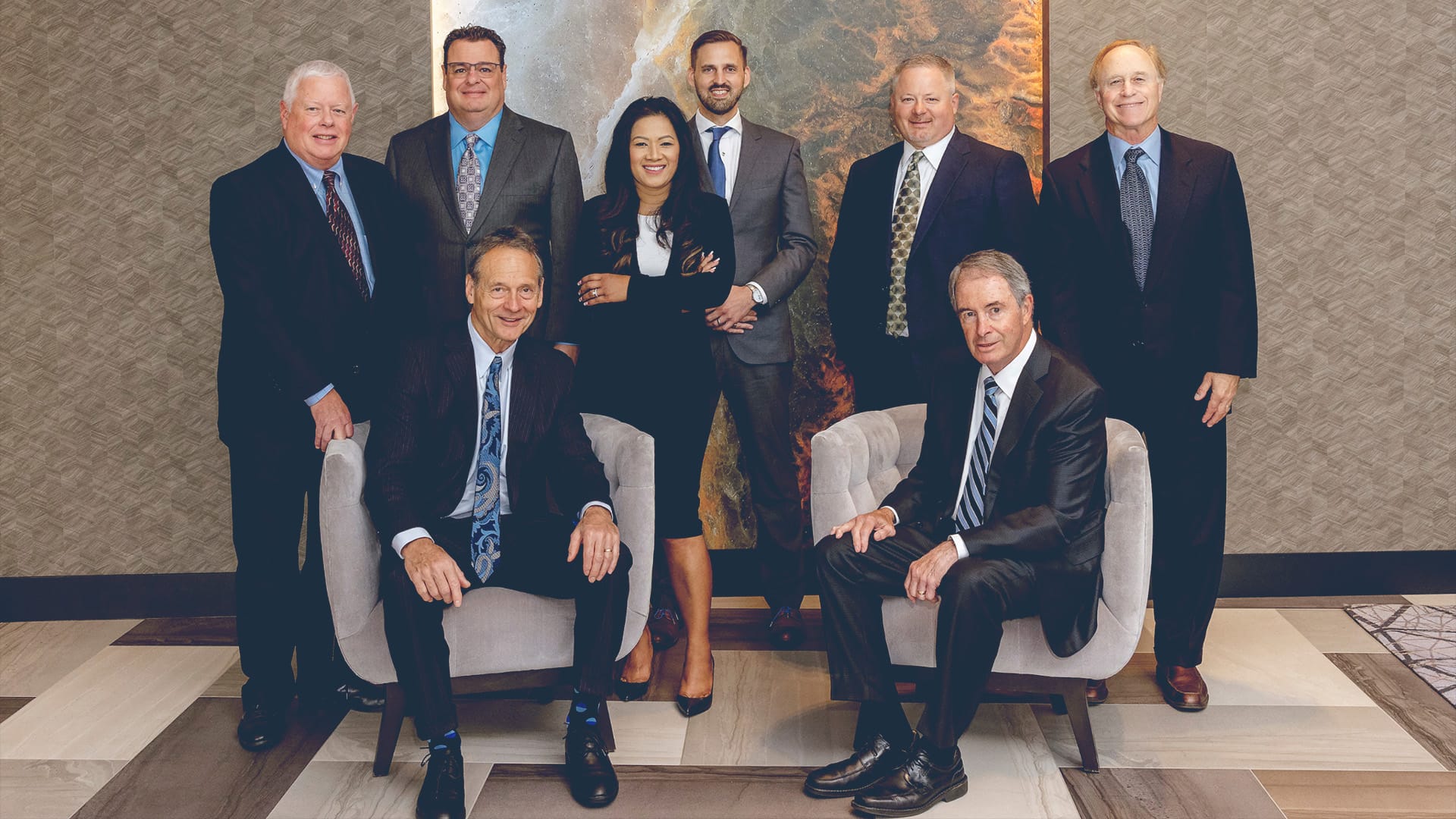
Tacoma Slip and Fall Attorneys
Have you suffered an injury in a slip and fall accident on someone’s property in or around Tacoma? A negligent property owner or another party might be liable and you may be entitled to compensation for your medical bills, lost wages, and pain and suffering.
At Rush, Hannula, Harkins & Kyler, PLLC, we understand the physical, emotional, and financial toll that a slip and fall accident can take on your life. Our dedicated team of personal injury attorneys in Tacoma is here to help you navigate the legal process, seek justice, and secure the compensation you deserve.
Schedule a free consultation with a Tacoma slip and fall lawyer to learn more about when you can file a slip and fall case.
Common Slip and Fall Types of Injuries
Slip and fall accidents can range from minor bumps and bruises to debilitating and serious injuries. The severity of your injuries will depend on various factors, including your age, overall health, and the force of the fall. Some of the most common slip and fall injuries in Tacoma include:
- Broken bones: Fractures in the wrists, arms, legs, hips, and ankles are frequent outcomes of slip and fall accidents.
- Head injuries: Concussions, cuts, and even more serious head trauma can occur, necessitating immediate medical attention.
- Soft tissue injuries: Sprains, strains, and tears in muscles, tendons, and ligaments are common, causing pain, swelling, and limited mobility.
- Back and neck injuries: Spinal cord injuries where falls can damage the spinal cord, discs, and nerves, leading to chronic pain, numbness, and weakness.
- Joint injuries: Dislocations and tears in the knees, shoulders, and other joints can significantly impact mobility and require extensive rehabilitation.
Common Causes of Slip and Fall Accidents in Washington State
Property and business owners have a duty to take precautions to maximize the safety of customers, tenants and guests. Slips and falls are common premises injuries, but premises liability deals with a wide array of faulty and dangerous conditions, including:
- Slippery floors
- Objects or debris left on floors
- Unsafe store displays including merchandise stacked too high on shelves
- Parking lot hazards
- Faulty stairways, handrails and walkways
- Inadequate lighting in parking lots and building entryways
- Inadequate security contributing to assaults at hotels, apartments, businesses, malls and other establishments in any area where crime is a problem
- Faulty conditions in common areas of housing developments such as apartments and condominiums
- Faulty elevators or escalators
- Unsafe golf course design
- Swimming pool injuries
A person who is injured by a faulty condition on another person’s property may be entitled to recover compensation for their injuries from the property owner. As in all cases involving negligence, liability depends on whether the property owner owed the injured person a duty of care and whether that duty of care was breached.
Where Slip and Falls Take Place
Slip and falls are one of the most common types of premises liability accidents, and they can happen anywhere, including:
- Grocery stores
- Gas stations and convenience stores
- Retail stores and malls
- Office buildings
- Doctor’s offices
- Parks and playgrounds
- Single-family homes
- Apartments and apartment complexes
- Sidewalks
- Parking lots and parking garages
- Gyms and other recreational locations
- Theaters
- Stadiums
What is Premises Liability?
Before diving into the specifics of your situation, it’s important to understand the legal concept at play – premises liability. This area of law holds property owners responsible for injuries sustained on their property due to unsafe conditions or negligence. The key factor determining the owner’s responsibility relies on your legal status at the time of the incident.
Your Status on the Property Matters
In the state of Washington, the degree of responsibility a property owner holds depends on your status at the time of the fall. Here’s a breakdown:
Invitee: This is the highest level of duty. If you were there for business or using the property for its intended purpose (e.g., customer in a store), the owner owes you a high degree of care to maintain safe conditions. They must actively identify and fix hazards and warn you of any unfixable problems.
Licensee: A lower duty applies to guests on private property with permission (e.g., visiting a friend’s house). The owner must simply avoid creating hidden dangers and warn you of known ones. A property owner’s duty of care to their licensees is less than that owed by property owners to invitees.
Trespasser: The lowest duty applies here. While there’s no obligation to warn of natural dangers, the owner cannot intentionally harm you or create hidden man-made hazards.
Proving Liability in Slip and Fall Cases
Even within these categories, establishing liability requires demonstrating:
The owner knew or should have known about the dangerous condition. This requires gathering evidence like incident reports and witness statements promptly, before they disappear.
The dangerous condition caused your fall and resulting injuries.
These cases can be complex, so seeking legal representation through a credible law firm quickly is crucial to preserving evidence and protecting your right to compensation.
Don’t Wait To Get Legal Advice From Our Tacoma Personal Injury Lawyers
Our slip and fall accident attorneys are well versed in premises liability law and can assess for you what your status on the property was – invitee, licensee, or trespasser – and the nature and extent of the owner’s duty to you. If a duty owed to you was violated, you may be entitled to compensation for your injuries, including, but not limited to, your medical expenses, your lost income and your pain and suffering. In many cases, the liable party is covered by their insurance company, which our slip and fall attorneys can help you navigate. If your fall claim cannot be resolved through this process, we will fight for you in court.
If you or a loved one has been injured due to a faulty or dangerous condition on another’s property, please contact the Tacoma based attorneys of Rush, Hannula, Harkins & Kyler, PLLC at (253) 242-2284 or click here to schedule your consultation.
Our initial consultation is free of charge and if we accept your case, we only get paid for our services if you receive monetary compensation.
Get Started
Do you have a case?
At Rush, Hannula, Harkins & Kyler PLLC we have the skill and experience to take on a wide range of personal injury cases throughout Washington state. From motor vehicle accidents to workplace injuries – our reputation and success rates keep opposing counsel on edge.

Frequently Asked Questions
We have answers to some of the most common Washington personal injury questions. These are resources for injury victims.
Do I need a lawyer to file a personal injury lawsuit?
It is not necessary to retain a lawyer to file your personal injury lawsuit. You should base your decision to involve an attorney on a reasonable assessment of the pros and cons. Rush, Hannula, Harkins & Kyler PLLC is a highly reputable personal injury law firm that has served Washington since 1959. We deliver value to our clients that far outweighs the fees we collect. But before you retain any attorney, you have to be satisfied that the benefits exceed the costs. We offer these points for your consideration.
What is the statute of limitations in Washington for personal injury?
How much does a personal injury lawyer cost?
How do I file a personal injury lawsuit in Washington state?
Our Impact
3,000+
Success Stories
The change you want to see happens when your story goes beyond the courtroom and makes an impact after the case is closed.
Let Us
Fight
For Your Story
We will demand the justice you deserve with relentless pursuit. On your side, is a firm ready and able to win.
